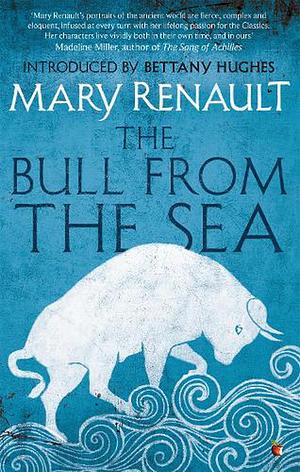2025/082: The Bull from the Sea — Mary Renault
Monday, June 2nd, 2025 08:53 amThe fire leaped high; it shone down the long stone-lined cutting into the mound, showing the painted doorposts of the burial vault, the new bronze hasps of the open doors, and the Erechthid snake upon the lintel. But it did not pierce the dark beyond; sometimes when my back was turned I could feel him standing in the shadows beyond the doorway to watch his rites, as they show dead men in the funeral pictures. [loc. 336]
Sequel to The King Must Die: I think as a teenager I read this first, an old paperback from the jumble sale. Narrated again by Theseus, it's the story of everything that happens after his return from Crete: his father's funeral, becoming king, his friendship with Pirithoos the Lapith (a Bad Influence, to be honest), his relationship with the Amazon Hippolyta, their son Hippolytus and Theseus' frustration with his chosen life... There are curiously primitive Kentaurs, an encounter with Oedipus, and a foreshadowing of Paris's Judgment: also a fleeting encounter with a young Achilles. And through it all, warp and weft, Theseus's sense of the gods: his religious and spiritual practices.
Again, though there is nothing that's definitely supernatural or mystical, those beliefs shade every experience he has. He attributes the stroke he suffers to Poseidon, though others say it was the Mother ('I had stolen two of her daughters out of her shrines, and tamed her worship at Eleusis') or Apollo ('I was struck without pain, as men are killed by his gentle arrows; and as I was only half to blame for his good servant’s death, he left me half alive.').
Though there are moments of great happiness, this is not a happy book. It's about pride and downfall, about misjudgements and poor choices. I had less patience with Theseus' piracy and war-making than with his bull-leaping: I was angry at his dismissal of his mother's valid concerns about how he might have offended the Great Mother, and especially his dismissal of abandoned Ariadne ('Do you know how the Wine King dies? She took to it like a fish to the sea, though she had been reared softly, knowing nothing of such things. There is rotten blood in the House of Minos' [loc. 661]); his treatment of his son is horrific, though he does realise this in the final chapter of the novel.
Renault's writing is superlative. I especially like her descriptions of landscape, and her ability to craft sentences that sound as though they have been translated from an ancient text. I'm saving my last unread Renault historical, The Praise Singer, for when I want to really immerse myself in her evocation of ancient Greece.
Man born of woman cannot outrun his fate. What need, then, to trouble his short morning with the griefs of time? He will never live to know them. [loc. 3831]
